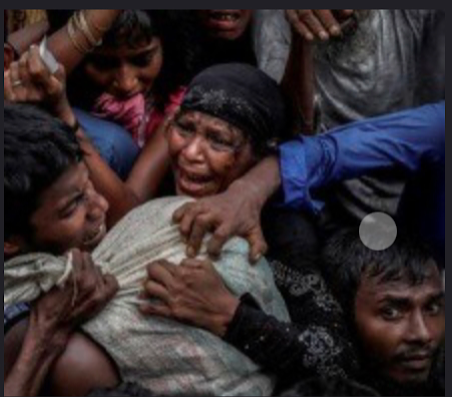Tens of thousands of Rohingya protesters demand to return to Myanmar
Refugees stage rallies near the border. More than a million are crammed in camps in south-eastern Bangladesh, which has the largest refugee settlement in the world. Protesters demand citizenship rights and assisted repatriation programmes. In 2022, 348 Rohingya died trying to reach Malaysia and Indonesia by boat.
Yangon (AsiaNews) – Tens of thousands of Rohingya refugees in Bangladesh staged mass rallies today, demanding to be repatriated to Myanmar which they fled in 2017 following a brutal military crackdown.
They appear undeterred by the fact that the country is again under military rule since February 2021 when the democratically elected government of the National League for Democracy (NLD) was ousted and its leader, Aung San Suu Kyi, arrested.
Crammed for years in sprawling refugee camps in south-eastern Bangladesh, amid poverty and squalor, more than a million Rohingya constitute the world's largest refugee settlement.
Most fled repression by Myanmar’s military almost six years ago, while some have been there for longer.
Protesters demand quick repatriation through the United Nations High Commissioner for Refugees (UNHCR). Some of their placards read: "No more refugee life. No verification. No scrutiny. No interview.” Others said: “We want to go back to our motherland” and "Let's go back to Myanmar. Don't try to stop repatriation.”
Surging crime, harsh living conditions and bleak prospects for returning to Myanmar are pushing more and more Rohingya refugees to leave Bangladesh by boat an risk their lives at sea to reach countries like Malaysia and Indonesia. UN data show that up to 348 Rohingya might have died at sea last year.
Rohingya community leader Mohammad Jashim is one of those who want to go back, but he also demands citizenship rights. “We are the citizens of Myanmar by birth,” he told Reuters, “with all our rights, including citizenship, free movement, livelihood, safety, and security”.
To this end, refugees are hoping for help from the United Nations. However, in the past, Myanmar's military showed no inclination to take them back; instead, for years, they saw the Rohingya as foreign interlopers and denied them citizenship and subjected them to abuse.
The first attempts at repatriation failed in 2018 and 2019 because refugees, fearing harsher repression, refused to go back. Under a pilot project, about 1,100 refugees were supposed to return, but “confined in camps”; for this reason, it was never implemented.
For densely populated Bangladesh, repatriation is the only possible solution, especially since it is currently going through its own social and economic crises.
Making matters worse, local Bangladeshi communities are increasingly hostile towards the refugees who need more resources as funding from major international humanitarian agencies dry up.
The World Food Programme (WFP) recently slashed its monthly food allocations from US to US per person.
"Our situation is only deteriorating. What future do we have here?" asked refugee Mohammed Taher, as he stood with other protesters. "In the name of verification and scrutiny, they (Myanmar) are only killing time."
15/11/2018 11:53
01/03/2019 14:13
24/01/2018 09:45







.png)










